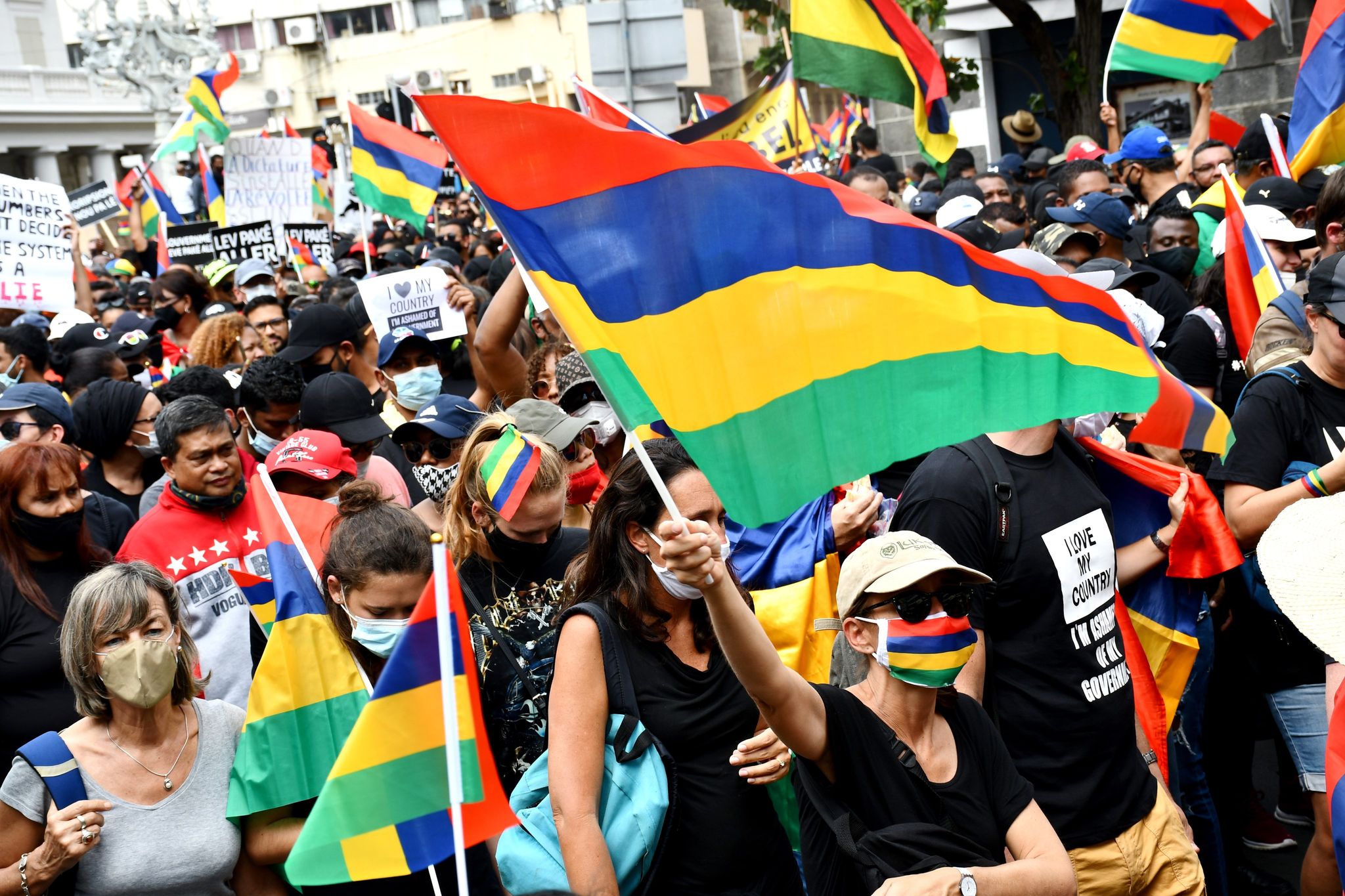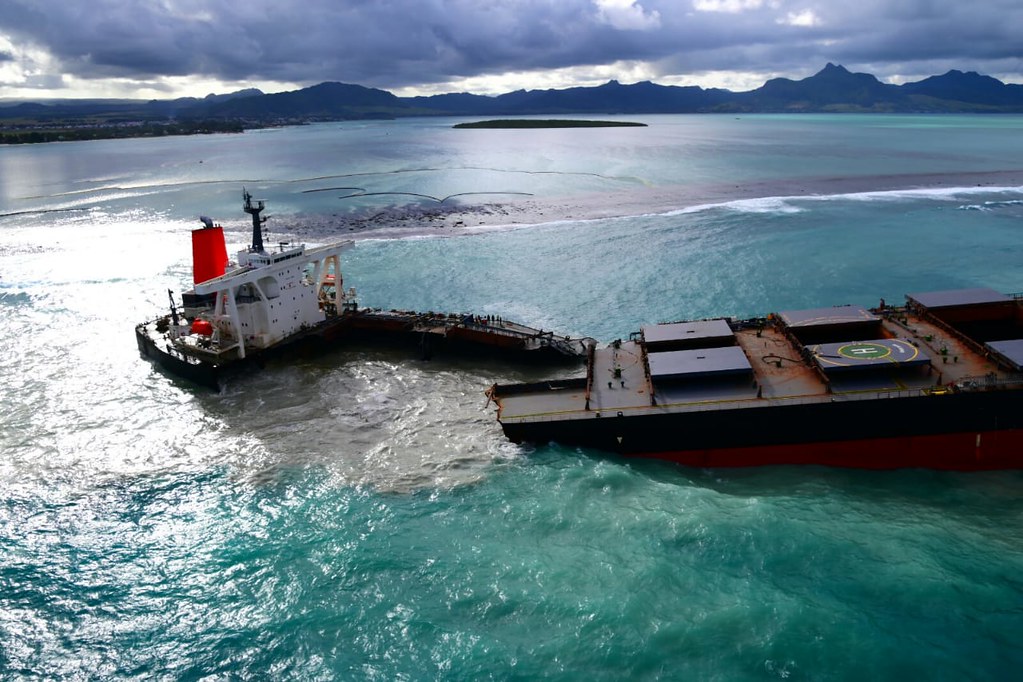This article is based on Anupah Makoond’s report entitled Beneath the Wakashio Oil Spill: Exploring the linkages between youth marginalisation, environmental disaster, and resilience for peace in a small island state.
As part of the series “Outside the Box: Amplifying youth voices and views on YPS policy and practice” published by Interpeace in partnership with Irish Aid, Anupah Makoond explores the link between the expression of popular discontent that followed the Wakashio oil spill incident of August 2020 and the Mauritian Government’s underinvestment in environmental protection. She positions her brief within the frame of youth voice exclusion and the role of peaceful protest and dissent as a means to claim civic space for youth. For her, post-Wakashio protests have exposed the extent to which youth priorities such as the environment have been side-lined in formal policy-making processes in Mauritius.
Anupah Makoond (author) attributes the causes of the 2020 Wakashio environmental disaster to poorly managed environmental and risk response policies in Mauritius. The ensuing protests were driven by concerns over the lack of preparedness to such risk and seeming disregard for future resources by authorities. Their slow response to the disaster was widely criticised as the void was filled by civil society groups, ordinary citizens and businesses. They responded by building artisanal booms to contain the spill, before authorities were able to formulate a coherent response and take over operations.
The Youth and Peace
Anupah Makoond puts forward the role of peaceful protest as a means for youth to claim civic space in formal political processes where they are generally excluded. She argues that the post-Wakashio protests have exposed the extent to which youth priorities such as the environment have been side-lined in formal policy-making processes in Mauritius. From its independence, elections have served as the principal mechanism for holding government accountable. Yet, youth are heavily under-represented in the parliament and the electoral pool: those below the age of 18 are unable to vote and two thirds of those eligible to vote are above the age of 35.
Framing her argument around the resilience-based approach to peacebuilding, the author puts forward the importance of studying peaceful and relatively peaceful countries such as Mauritius, to expand the repertoire of approaches to sustaining peace. In a country with a history of ‘resilience for peace’, she argues that the failure to prioritise youth concerns represents a missed opportunity for updating and validating the social contract and strengthening the island’s resilience for peace.

Sustaining Peace and Resilience
In 2016, the United Nations introduced the concept of ‘sustaining peace’ to its policy lexicon. However, as highlighted in the brief, there is ongoing debate on what sustaining peace entails. For the author, we need a resilience-based approach which can address some of the limitations of peacebuilding orthodoxy. Scholars are increasingly recognising the value of studying peaceful societies and several projects have been initiated to study the determinants of peace. The latter requires all individuals to engage with peace proactively, rather than merely as a response to conflict. One of the most important practical implications is that peace becomes a national priority for all countries, not only those that are considered ‘fragile.’ The approach also calls to challenge perceptions and often gendered-stereotypes around youths, often cast as either threats, or as victims of violence. The voice of the youth making positive contributions to sustaining peace remains to be heard.
Sustaining Peace in Mauritius: harnessing resilience through the social contract
Mauritius’ resilience to peace is rooted in the institutions, policies, unwritten social norms, and historical legacies that have sustained peace. These include regular elections, a free press, and an independent judiciary, all of which constitute mechanisms for participation in public policies. Within Mauritius’ multi-ethnic fabric, an electoral best-loser system guarantees the representation of each ethnic group in parliament, hence ensure ethnic minority representation in decision making. The author further points to more informal norms, including a culture of tolerance for different ethnic groups and opportunities for cross-ethnic socialisation in the workplace, at school, and in other venues as important mechanisms of sustaining peace. Yet, the aging Mauritian social fabric is bringing new challenges to peace resilience in the country.
The Marginalisation of Youth Priorities
Anupah Makoond argues that there is a marginalisation of youth priorities by Mauritian authorities. In a context of extensive social welfare benefits such as free healthcare and universal pension, the high life expectancy and low fertility rate of the population create an ageing population whose burden will rest on the youth’s shoulders. Social policy spending in Mauritius has always been highly biased in favour of the elderly but the pandemic pushed further budgetary cuts in education, health, environmental protection, and youth empowerment. For the author, the authorities’ policy focus on citizens over 60 and away from environmental matters further marginalises youth priorities and youth voice. She argues that such marginalisation weakens the country’s sustained resilience to peace.
The MV Wakashio Incident: a call to action for updating the social contract
The authorities’ lack of preparedness in its ability to respond to the 2020 Wakashio can be explained by the budgetary cuts in disaster risk reduction and environmental protection. This lack of preparedness created a void filled by civil society and pushed environmental activists to raise the alarm on the island’s vulnerability to climate change. For Anupah Makoond, the August 2020 peaceful protest, led by youth activism, was a call of action for authorities to review their priorities and consider sustainability as a cornerstone of policy making.
She calls for greater inclusion of youth in decision making and for the social contract of Mauritius to be updated: a rethink beyond free education and universal pension. The needs and aspirations of the youth need to be factored through engagement of youth in government’s policies. With no official channels to hear their voice or to represent them, the author calls for increased channels of communication between government and the youth. For her, the promotion of a future-oriented outlook in policy making can help in reflecting youth’s expectations in policies while sustaining peace and security.
Read the full Brief by Anupah Makoond here.
Main photo by International Maritime Organisation on Flickr.
Charles Telfair Centre is an independent nonpartisan not for profit organisation and does not take specific positions. All views, positions, and conclusions expressed in our publications are solely those of the author(s).
